|
|
|
Sort Order |
|
|
|
Items / Page
|
|
|
|
|
|
|
| Srl | Item |
| 1 |
ID:
173224
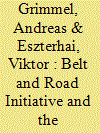

|
|
|
|
|
| Summary/Abstract |
This article examines how states may be inclined to adapt to the policy goals of powerful economic partner states in acts of ‘anticipatory conformity’ or by adjusting their ‘common’ policy goals. It builds on two classical theoretical bases—the concept of economic statecraft and Hirschmanesque effects—to explore how economic power may be translated into far-reaching effects on other states’ behaviour without a clear goal or objective being proclaimed or even set by the economically powerful state. Our empirical findings suggest that the European Union still has an unparalleled influence on member states, and China’s growing economic presence in Europe alone—especially in the framework of the Belt and Road Initiative—is insufficient to influence member states’ politics.
|
|
|
|
|
|
|
|
|
|
|
|
|
|
|
|
| 2 |
ID:
097923
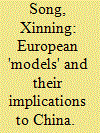

|
|
|
|
|
| Publication |
2010.
|
| Summary/Abstract |
European Studies in China developed very rapidly in the last twenty years. The reasons for that are not only because of the smooth evolution of EU-China relations and wider and deeper economic interdependence between two economic giants, but also the relevance of the European models to China's domestic political and social development, as well as China's external relations. The article reviews the evolution of the European Studies in China and finds out that more and more research on European affairs relates to China's internal and external development. Two major aspects of the learning process are exploited further. Firstly, European models for China's domestic political and social development, including European party politics and Democratic Socialism, European social policy and social security systems, and European regional policies. Secondly, European models for China's foreign policy and external relations, including European neighbourhood policy, European concept of effective multilateralism, Europe as an example of peaceful rise, and functionalism as the way to East Asian regional integration. The EU or Europe has higher profile in China than any other Asia Pacific country. From the domestic political and social development and China's preference in international affairs we can see the silhouette of the European models. Chinese would like to learn more from Europe than the United States. It also shows clearly that the role of the EU as a social power.
|
|
|
|
|
|
|
|
|
|
|
|
|
|
|
|
| 3 |
ID:
141204
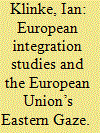

|
|
|
|
|
| Summary/Abstract |
European integration studies has recently seen the first signs of a belated critical turn. While new approaches have started to challenge the way the European Union is conventionally studied, they are yet to investigate in detail the relationship between the academic field and its primary object of study. This article draws on work in critical geopolitics to explore one of the interfaces of academic knowledge on European integration and the world of policy: the Jean Monnet Programme. In highlighting the scheme’s role in the EU’s Eastern geopolitics, it argues that European integration studies resembles other forms of area studies, such as cold war era Sovietology. This comparison elucidates both the field’s long-standing resilience to critical theory and its inability to anticipate the recent crisis of the European project.
|
|
|
|
|
|
|
|
|
|
|
|
|
|
|
|
| 4 |
ID:
112408
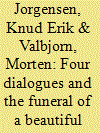

|
|
|
|
|
| Publication |
2012.
|
| Summary/Abstract |
This article engages in the debate on (the study of) regionalism in providing an overview of the nexus between European Studies (ES) and (New) Regionalism (NR). While the immediate purpose for doing so is to set the stage for the future debate on regional dynamics, this exploration can also be perceived as a case study into (the plurality of forms of) inter/intra-disciplinary dialogue demonstrating the necessity of engaging in 'dialogues about dialogues'. The article starts by developing a new typology of four different ideal-typical notions of dialogue: hierarchical, reflexive, transformative and eristic models of dialogue. Each of these models is then used to examine different ways of answering questions about why a dialogue between ES/NR should be of interest or not; what ES has to offer; what the coveted impact of such a dialogue is supposed to be; and, finally, which promises and pitfalls such a conversation holds. In this fashion, the stage for future debate addressing regional integration is outlined. It is concluded that these futures look bleak, however, especially because ES and NR no longer appear as each other's ideal partner-in-dialogue and the relationship is likely to come to an end and hence await its own funeral.
|
|
|
|
|
|
|
|
|
|
|
|
|
|
|
|
| 5 |
ID:
126798


|
|
|
|
|
| Publication |
2013.
|
| Summary/Abstract |
In a recent piece in this journal Jørgensen and Valbjørn develop a typology of intellectual dialogue across fields that yields rather negative conclusions about the prospects for sustainable dialogue between 'European studies' and the 'new regionalism'. This response disputes this pessimistic conclusion. First, it is argued that while their derivation of models of dialogue is impressive, it is nonetheless incomplete. Using Jørgensen and Valbjørn's premises, the article derives a 'market' mode of dialogue that represents a challenge to their assumption that dialogue will tend towards hierarchy. Second, the article accepts that there are important 'sociology of knowledge' impediments to effective dialogue within political science and International Relations, but maintains that Jørgensen and Valbjørn fail to work through the question of 'dialogue between whom?' The article argues that methodological division is the most significant impediment to dialogue, but maintains that within-methodology dialogue is more than viable in the case under scrutiny in this debate. Third, having established these general parameters of disagreement, the article moves to a number of more particular criticisms of the assumptions made by Jørgensen and Valbjørn about extant calls for dialogue between scholars in these two fields.
|
|
|
|
|
|
|
|
|
|
|
|
|
|
|
|
| 6 |
ID:
133301


|
|
|
|
|
| Publication |
2014.
|
| Summary/Abstract |
This paper aims at analysing the factors behind the change in aggregate energy consumption in the EU-27, also identifying differences between member states. The logarithmic-mean Divisia index method (LMDI) is applied to multiplicatively decompose, at the country level, the variation in aggregate energy consumption in the EU-27 member states for the 2001-2008 period. We also analyse the sensitivity of the results when several aggregation levels are considered, with energy intensity used as the criterion to aggregate countries. This allows us to check robustness of results, also enabling an improved understanding of both inter and intra-unit effects. Results indicate that improvements in energy efficiency in the EU-27 were not enough to overcome the pressure of European economic activity on aggregate energy consumption. Mediterranean countries, and especially former communist states, increased their energy consumptions, most of them favoured by structural change. The analysis also reveals that the impact of intra-group movements on aggregate energy consumption is partially offset when moving from higher to lower aggregation levels.
|
|
|
|
|
|
|
|
|
|
|
|
|
|
|
|
| 7 |
ID:
129818


|
|
|
|
|
| Publication |
2014.
|
| Summary/Abstract |
On 5 June 2008, then Russian President Dmitry Medvedev proposed a new European security architecture. Medvedev suggested that the new security architecture could be considered a 'Helsinki Plus' treaty, an adaptation of the Helsinki Final Act to the current international state of affairs. This article examines how Russia was strategically reframing European security through its proposal for a new European security architecture, and in particular the sub-issues of how Russia was strategically framing security and European security and how this framing was an attempt to change existing formulations and perspectives on European security.
|
|
|
|
|
|
|
|
|
|
|
|
|
|
|
|
| 8 |
ID:
097007
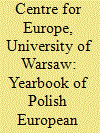

|
|
|
|
|
| Publication |
Warsaw, Centre for Europe, University of Warsaw, 2009.
|
| Description |
266p.
|
| Contents |
Vol 12/2009
|
| Standard Number |
14281503
|
|
|
|
|
|
|
|
|
|
|
|
Copies: C:1/I:0,R:0,Q:0
Circulation
| Accession# | Call# | Current Location | Status | Policy | Location |
| 054919 | 332.094/CEN 054919 | Main | On Shelf | General | |
|
|
|
|
|
|
|
|
|